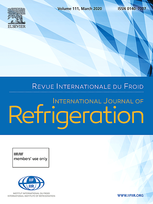
Summary
Two schemes of power and refrigeration cogeneration Kalina cycle with adjustable refrigeration temperature (PPRAT-KC) based on the efficient cogeneration cycle PPR-KC are proposed and studied. In the PPRAT-KC, the refrigerant vapor is absorbed in a pressure adjustment absorber with dilute solution either from the separator or the low-pressure pump, and by altering the flow rate of the dilute solution, the refrigeration temperature is able to be adjusted with nearly no effect on the amounts of energy outputs. The amount of net power or refrigeration capacity in the PPRAT-KC can be also adjusted by changing the flow rate of solutions fed to the power and refrigeration sub-cycles. Under temperatures of heat source and cooling water of 400℃ and 30℃, respectively, the change range of refrigeration temperature for the two schemes of the PPRAT-KC are about from -22℃ to 7.5℃, and the performances of the two schemes are similar. With the same work concentration of 0.5 and refrigeration temperature of -15℃, the effective exergy effeciency of PPRAT-KC is 0.5653, which is 4.145% and 10.97% higher than those of the PPR-KC and the triple pressure Kalina cycle, respectively.
Available documents
Format PDF
Pages: 706-713
Available
Public price
20 €
Member price*
Free
* Best rate depending on membership category (see the detailed benefits of individual and corporate memberships).
Details
- Original title: Thermodynamic study on power and refrigeration cogeneration Kalina cycle with adjustable refrigeration temperature.
- Record ID : 30029176
- Languages: English
- Subject: Technology
- Source: International Journal of Refrigeration - Revue Internationale du Froid - vol. 131
- Publication date: 2021/11
- DOI: http://dx.doi.org/10.1016/j.ijrefrig.2021.05.014
- Document available for consultation in the library of the IIR headquarters only.
Links
See other articles in this issue (95)
See the source
-
Thermodynamic analysis of a novel combined powe...
- Author(s) : BEHNAM P., FAEGH M., SHAFII M. B.
- Date : 2019/08
- Languages : English
- Source: International Journal of Refrigeration - Revue Internationale du Froid - vol. 104
- Formats : PDF
View record
-
Study on approaches of extending refrigeration ...
- Author(s) : YANG S., FANG F., CHEN Y., WU J., ZHANG S.
- Date : 2021/11
- Languages : English
- Source: International Journal of Refrigeration - Revue Internationale du Froid - vol. 131
- Formats : PDF
View record
-
Investigation of new cooling cogeneration cycle...
- Author(s) : SHANKAR R., RIVERA W.
- Date : 2020/06
- Languages : English
- Source: International Journal of Refrigeration - Revue Internationale du Froid - vol. 114
- Formats : PDF
View record
-
Development and analysis of a novel CSP source ...
- Author(s) : KHALIQ A., REFAEY H. A., ALHARTHI M. A.
- Date : 2021/10
- Languages : English
- Source: International Journal of Refrigeration - Revue Internationale du Froid - vol. 130
- Formats : PDF
View record
-
Energetic and exergetic performance investigati...
- Author(s) : KHALIQ A.
- Date : 2017/02/05
- Languages : English
- Source: Applied Thermal Engineering - vol. 112
View record
